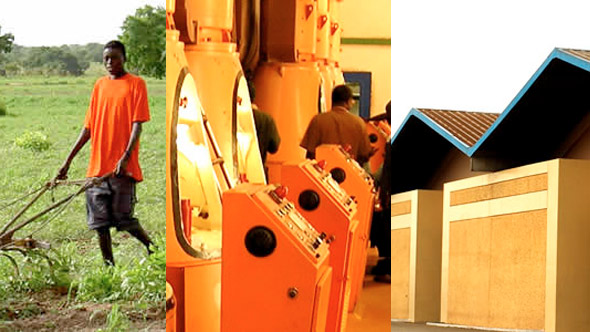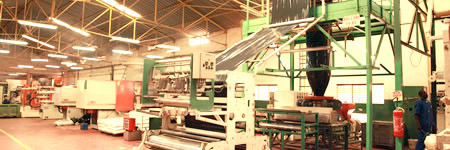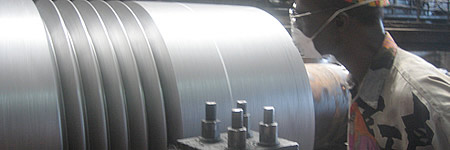Economic Development of Ivory Coast
To the average American or even European business person, one of the most remarkable developments, not only in Cote d’Ivoire but throughout much of the developing world, is the work of the Aga Khan Development Network (AKDN).

Industrial Promotion Services West Africa (IPS WA)
To the average American or even European business person, one of the most remarkable developments, not only in Cote d’Ivoire but throughout much of the developing world, is the work of the Aga Khan Development Network (AKDN) which comprises nine agencies. One of them is the Aga Khan Fund for Economic Development (AKFED) which includes Industrial Promotion Services West Africa (IPS WA) that operates in Cote d’Ivoire and neighboring West African countries.
AKFED operates more than 90 separate project companies, and employs over 30,000 people. The project companies of the Aga Khan Fund for Economic Development (AKFED) generated revenues of US$ 2.3 billion in 2010 and all surpluses are reinvested in further development activities.
What is the Aga Khan Development Network?
The Aga Khan Development Network has been gradually established over the past 50 year by His Highness the Aga Khan — the spiritual leader of Shia Ismaili Muslims. The Network is active in a number of development sectors, ranging from education to health to cultural preservation and restoration to economic development. The agencies of AKDN work in some 35 countries of Asia, Africa and the Middle East. The Network is non-denominational i.e, it serves beneficiaries irrespective of their faith.
The Aga Khan Fund for Economic Development (AKFED)
The Aga Khan Fund for Economic Development (AKFED) is AKDN’s for-profit economic development arm. Created in 1984, AKFED grew out of the financial institutions founded in the earlier part of the 20th century.
AKFED concentrates on socially responsible, technologically appropriate, economically viable, and environmentally sensitive projects that are beneficial to the long term development needs of the countries and areas where the agency invests. In addition to bringing financial backing to investment projects, AKFED provides access to financial resources as well as expertise in human resources management, technical know-how, marketing, and financial planning.
AKFED is active in a number of sectors, such as aviation, utilities, media services, tourism development, banking, insurance, and property management, to name just a few. Today, AKFED operates more than 90 separate project companies, and employs over 30,000 people. The project companies of the Aga Khan Fund for Economic Development (AKFED) generated revenues of US$ 2.3 billion in 2010 and all surpluses are reinvested in further development activities.
Industrial Promotion Services (IPS)
IPS was established in 1963 to encourage and expand private enterprise in countries of sub-Saharan Africa and South Asia. To date, over 70 industrial projects have been launched in the fields of food and agro-industries, printing, packaging, metal products, and textiles. As governments look increasingly to the private sector for provision of services, AKFED is using IPS to build infrastructure projects in telecommunications, water, sewage treatment, and power generation. 
In each country or region an IPS branch provides venture capital, technical assistance, and management support to local private efforts to develop infrastructure or serve the economic community. Growth, privatization, and re-orientation away from import substitution towards export promotion are among the prime goals of each IPS branch. Knowledge of local conditions and the ability to foster good relations with local communities as well as rigorous management standards have made IPS’s national affiliates attractive partners for foreign investors.
IPS in Cote d’Ivoire
AKFED’s and IPS’s first investment in Cote d’Ivoire was the packaging sector in 1965 and then in infrastructure in the USD $225m investment in the Azito Energy Project.
The Azito plant is the largest private sector power plant in sub-Saharan Africa, and it currently supplies 40% of the electricity generation needs of the country.
|
loading the player….
|
IPS West Africa (IPS WA)
IPS WA presently operates across West Africa in Cote d’Ivoire, Burkina Faso, Mali, and Senegal. Besides the Azito power generation facility in Cote d’Ivoire, IPS WA is increasingly active in developing private businesses and investment opportunities in Côte d’Ivoire. Recently, IPS WA signed a new agreement with the government of Côte d’Ivoire to use the exhaust gas produced by the two existing gas turbines of the plant to power a steam turbine instead of letting the gas escape into the air. This will increase the energy production by 50% without using additional fuel.
According to Mahamadou Sylla, deputy CEO, IPS WA is directly involved in the cotton business of Cote d’Ivoire: “We are in the cotton business – we help cultivators with seeds, fertilizers, training and development. Eventually, we buy cotton and export the fiber for the production of jeans. We are present in the cotton market in both Burkina Faso and the Côte d’Ivoire, in which we represent 50% of the market.”
Sylla also explains how IPS WA is becoming engaged in the cashew business as a result of its involvement in cotton: “Our cotton cultivators in the north also produce cashew nuts. It’s a side business for them. But the selling price of raw cashew nuts is so low that we have decided to help them increase that price by processing and exporting it. We help them make more profit out of it. Côte d’Ivoire produces 400,000 tons of cashew nuts a year and only about 10,000 tons are processed locally. We want to help them to produce more locally so that they can support the cultivators up north.”
The Rigorous Standards of IPS WA
IPS WA applies the basic investment and development principles of AKDN. This means that financial return is never the sole criterion for a project. In addition to profitability — which means economic and financial sustainability — any potential project must also meet several other criteria, as Mahamadou Sylla explains:
“As in any other business, we need to be profitable. At the same time, we are responsible for the individuals with whom we do business (cotton cultivators, villagers around the sugar plantation, etc.) by building health facilities, and schools. This is a constraint that we have in addition to our business-related responsibilities. Every one of our investments is subject to rigid criteria. These criteria put emphasis not on maximizing of profits but on maximizing of social development and social benefits. There is one more factor we look at before we present a case to our head office: its contribution to development. Is it labor intensive? Does it help the Côte d’Ivoire develop its industry? These are aspects we analyze on top of the financial criteria.”
Mahamadou Sylla believes Côte d’Ivoire is a great place to invest. “It’s quite simple,” he says, “this country is going to grow—and the national growth in the coming years will be phenomenal.” He argues that Côte d’Ivoire is definitely the place to start for investors interested in Africa because of the country’s strong infrastructure (power, roads, communication, etc).
Prospects for Investors —“My advice is to come, and come quickly”
Mahamadou Sylla believes Côte d’Ivoire is a great place to invest. “It’s quite simple,” he says, “this country is going to grow—and the national growth in the coming years will be phenomenal.” He argues that Côte d’Ivoire is definitely the place to start for investors interested in Africa because of the country’s strong infrastructure (power, roads, communication, etc).
Sylla notes that Côte d’Ivoire is part of ECOWAS (the Economic Community of West African States) — a free trade zone that represents 200 million consumers.” He says investors should hurry to invest in Côte d’Ivoire:
“The strategy would be to set up the company here and then explore the surrounding markets. This is the right time to do it as the economy will grow, and the sub-regions’ economy will grow as well, as they are very dependent on the Côte d’Ivoire. My advice is to come, and come quickly.”

Sylla also lists several reasons why potential investors should consider partnering with IPS WA: “We’ve been around for 40 years in all these countries” he says, we’ve developed an expertise to manage locally, we look out for international opportunities, we are [often] approached by banks and international lenders and our goal is clear: we want to double the size of our business in 5 years, by expanding further into agro-industry, infrastructure and energy.”